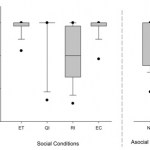Moral Psychology
Eric M. Johnson and I spent about 45 minutes discussing "evolutionary psychology beyond sex" last night, which you can see today on Bloggingheads "Science Saturday."
Or just watch it here:
"Two chimps had been shut out of their shelter by mistake during a cold rain storm. They were standing dejeted, water streaming down their shivering bodies, when Professor Köhler chanced to pass." Upon opening the door for the two chimps, Dr. James Leuba recounts, "instead of scampering in without more ado, as many a child would have done, each of them delayed entering the warm shelter long enough to throw its arms around his benefactor in a frenzy of satisfaction."
"Chimpanzees," primatologist Frans de Waal points out, "do not normally hug their caretakers for no reason." It's a compelling…
Ravi Iyer, a graduate student and colleague of mine at the University of Southern California in social psychology, blogs regularly about moral psychology at polipsych.com, and tweets from @ravi_polipsych. He collaborates with others on YourMorals.org, where interested individuals may participate in research in political and moral psychology. I asked him to contribute a guest post about his work.
As a moral psychology researcher, I was very excited when Jason wrote that his posts this week would cover moral psychology, and I have enjoyed his previous posts concerning the evolution of morality…
Morality and convention are so mired in culture that it may seem near impossible to determine the extent to which biology and environment give rise to it. And yet it is possible to investigate the evolutionary origins of morality. Research with infants - especially pre-verbal infants - who have not yet been sufficiently exposed to most cultural institutions, can provide an opportunity to determine what the evolutionary and developmental building blocks are for complex moral reasoning.
Human adults evaluate individuals very quickly, on the basis of both physical and behavioral traits and…
Cooperation and conflict are both a part of human society. While a good deal of the academic literature addresses the evolutionary origins of conflict, in recent years there has been an increased focus on the investigation of the evolutionary origins of cooperative behavior. One component of cooperative behavior that might be present in other animals is aversion to inequity. Some scientists have suggested that inequity aversion may itself be the main factor driving the enforcement of cooperation. Put simply, inequity aversion is the resistance among partners to unequal rewards following…
Quandaries such as those involving stealing a drug to save a spouse's life or whether or not to have an abortion have historically dominated the study of the development of moral thinking. The predominant research programs in psychology today use dilemmas in which one choice is deontologically correct (it is wrong to rotate a lever that will divert a train and kill one person instead of five), and the other is consequentially correct (kill one person if it will save five others).
It is not surprising that psychologists have followed philosophers in proposing definitions for morality that…




